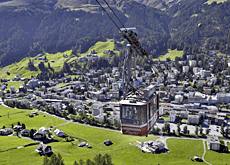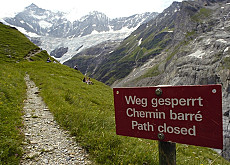Tourist industry faces climate dilemma

High-ranking officials from the world's burgeoning tourist industry are gathering in the Swiss resort of Davos to find ways to deal with the impact of climate change.
Industry representatives, headed by the United Nations World Tourism Organization (UNWTO), will discuss measures to adapt to global warming and reduce the industry’s large carbon footprint.
The UNWTO admitted ahead of the three-day meeting that tourism was responsible for between four and six per cent of the world’s total carbon dioxide emissions.
With a total of 846 million international arrivals (number of people travelling to a country other than their own) in 2006, the UNWTO says “the important travel and tourism sector is a contributor to greenhouse gas emissions and [also] highly vulnerable to the effects of climate change”.
It says tourism by its very nature is bad for the climate – even when one takes into account only emissions from cars, buses and planes and the large amounts of energy required to heat or cool hotels.
More worrying, according to the UNWTO, is the prediction that if action is not taken soon, the sector’s CO2 emissions “could grow by 150 per cent in the next 30 years” since the number of international arrivals is set to rise.
“The real issue is that we have to find an answer to the problem over the next 50 years and that we have to start it as rapidly as possible,” Geoffrey Lipman, UNWTO assistant secretary-general, told swissinfo.
Lipman emphasised that the meeting was co-sponsored by two other UN agencies, the UN Environment Programme and World Meteorological Organization.
Davos Declaration
“You have the science, the environmental ethos and the tourism strategic policymaking side coming together,” he explained.
The recommendations from the conference will form the basis of the Davos Declaration.
The declaration, Lipman said, would be submitted to a ministerial-level meeting in London next month and factored into the UN’s overall climate change strategy to be negotiated in December in Bali, Indonesia, where the focus will be on post-Kyoto action.
“This is the key thing – making sure it’s part of the road map the UN secretary-general, Ban Ki-moon, will propose in Bali.”
Participants in Davos are expected to try to develop a sustainable way forward for the transport sector, accommodation and tour operators as well as survival strategies for countries where large segments of the population are highly dependent on tourism.
The UNWTO breaks these down into coastal and island destinations, mountain regions and states with popular natural or cultural attractions.
Paradise lost
While many a tropical island paradise is threatened by rising sea levels, Mediterranean resorts are challenged by water shortages. On the other hand, hundreds of ski resorts in alpine nations could go out of business owing to a lack of snow.
“Davos is symbolic in that it is the kind of mountain sports zone that is so much under threat,” UNWTO Secretary-General Francesco Frangialli said of the choice of the venue.
Key for Frangialli is the organisation’s goal of ensuring “coherence between action on poverty reduction and climate change”, since, he says, “tourism is an important player in both, representing the main economic driving force for several developing states”.
According to the UNWTO, “tourism is one of the major export sectors of poor countries and a leading source of foreign exchange in 46 of the 49 Least Developed Countries (LDCs)”.
In order to set a good example, the UNWTO has waived all registration fees for the Davos conference. Instead, it has encouraged participants to sign up to carbon offset schemes with the aim of making the meeting carbon neutral.
swissinfo, Dale Bechtel in Davos
In 2003 UNWTO held its first Summit on Climate Change and Tourism in Djerba, Tunisia. Attended by governments, industry and civil society it produced the Djerba Declaration which set a proactive agenda for sector response.
Climate change is now a top issue for policymakers around the world and tourism is an important element of the discussions.
UNWTO is planning to review its Djerba Declaration and explore ways for tourism to respond to today’s climate priorities while still ensuring its commitment to the Millennium Development Goals.
September 24: UN Secretary-General Ban Ki-moon seeks to advance the global agenda on climate change when he meets heads of state and other top officials from more than 150 countries at the United Nations. More than 70 heads of state or government are due to attend the one-day event, making it the largest meeting ever of world leaders on climate change.
October 1-3: The second International Conference on Climate Change and Tourism is being held in Davos, Switzerland.
November 12-17: The 27th session of the Intergovernmental Panel on Climate Change is to take place in Valencia, Spain.
December 3-14: The United Nations Climate Change Conference, in Bali, Indonesia, will bring together representatives of more than 180 countries with observers from intergovernmental and nongovernmental organisations.

In compliance with the JTI standards
More: SWI swissinfo.ch certified by the Journalism Trust Initiative




You can find an overview of ongoing debates with our journalists here. Please join us!
If you want to start a conversation about a topic raised in this article or want to report factual errors, email us at english@swissinfo.ch.